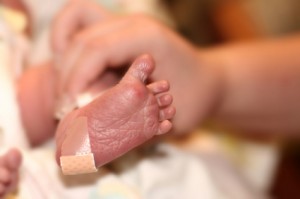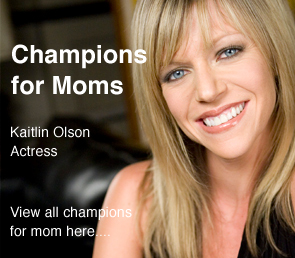 This is the 30th in a series on Booby Traps, made possible by the generous support of Motherlove Herbal Company.
This is the 30th in a series on Booby Traps, made possible by the generous support of Motherlove Herbal Company.
Blood sugar. It’s a concept familiar to those of you who are diabetic or have had gestational diabetes, but to others it’s the last thing we think we have to learn in preparation for our babies’ birth.
But in some hospitals, all babies are checked for low blood sugar. In spite of recommendations from the American Academy of Pediatrics to the contrary, “many hospital nurseries,” says this journal article, “continue the clinical practice of routine early glucose screening on healthy, term newborns.” This has significant consequences for breastfeeding.
But let’s back up a bit. Why would anyone want to know about a baby’s blood sugar levels? Glucose is the primary source of energy for our cells, and it’s transported by our bloodstream. Low glucose levels can cause anything from irritability and jitteriness to seizures in babies. But only a small percentage of babies are at risk for low blood glucose. Healthy, term newborns born after a normal pregnancy and delivery are not at risk, yet they are sometimes screened anyway.
Why would routine screening of all babies for blood glucose levels be detrimental to breastfeeding? Because a low blood glucose reading often results in formula supplementation, and sometimes separation of the mother and baby. Supplementation can lead to problems with milk supply and sometimes with the ability of babies to feed from the breast. According to the Academy for Breastfeeding Medicine, “it is clear that the routine monitoring of blood glucose in healthy term infants is not only unnecessary but is potentially harmful to the establishment of a healthy mother-infant relationship and successful breastfeeding patterns.”
This article in the Journal of Midwifery and Womens’ Health, outlines the risks more specifically, raising concerns about “1) the consequences of early maternal-infant separation, 2) the influence of early formula supplementation on breastfeeding discontinuance rates, 3) the effect of separation and supplementation on the onset of lactogenesis, and 4) the impact of hospital staff and provider recommendations of formula supplementation on maternal confidence to independently nurture her baby.”
 A big part of the problem is that until recently, it wasn’t widely acknowledged that breastfed babies’ blood sugar fluctuations are different than formula-fed babies’. Breastfed babies have naturally lower blood sugar levels and higher ketones than formula-fed babies. But poor understanding of this led providers to mistake normal for dangerous and consequently order supplementation.
A big part of the problem is that until recently, it wasn’t widely acknowledged that breastfed babies’ blood sugar fluctuations are different than formula-fed babies’. Breastfed babies have naturally lower blood sugar levels and higher ketones than formula-fed babies. But poor understanding of this led providers to mistake normal for dangerous and consequently order supplementation.
Fortunately, the American Academy of Pediatrics has recently issued a policy statement which clearly states that routine screening of healthy, term infants is inappropriate, and which also clearly states that there are differences between breastfed and formula-fed babies’ blood sugar fluctuations.
The AAP’s new statement is far more clear about who should and shouldn’t be routinely tested. Here’s what it says:
- Breastfed babies have lower glucose concentrations but higher concentrations of ketone bodies than formula-fed infants.
- Healthy, full term babies born after a normal pregnancy and delivery should not be tested for low blood sugar.
- Screening should be limited to “at risk” infants, defined as those who are small or large for gestational age, babies who are late-preterm, those who are born to mothers who have diabetes, and those who show symptoms of low blood glucose.
The prior AAP statement issued in 1993, had been a bit lukewarm on the issue, stating that universal glucose screening wasn’t justified by the literature and that limiting screening to at-risk babies “may be more appropriate.” It also concluded, however, that in nurseries where more than half of the babies are considered high risk, “screening of all infants may be appropriate.”
So we should applaud the new policy, and as mothers be prepared to refer to it if we expect to birth in a hospital in which routine screening for healthy, full term infants with no symptoms remains, unhappily, the standard of care.
Was your baby tested for low blood sugar even though she wasn’t considered high risk? Did affect your breastfeeding experience?















In my case blood glucose screening actually helped our breastfeeding relationship! I had a c-section and normally they wouldn’t let me hold the baby for several hours, but since my daughter (my third c-section baby) had low blood sugar they brought her to me in the recovery room. I was encouraged to feed her to bring up her numbers! I’m surprised they didn’t try to supplement her. After waiting so long to see my other babies I was glad her blood sugar was low. We were nursing within about 30mins of her birth.
you for this article. This describes my experience with my son. (we live in Canada) He was delivered by c-section and had a glucouse test that did lead to him being given formual despite my protests. I was able to delay it some but in the end he had more formula then I wanted. We had a difficult time intially rwith breastfeeding and took over 6 weeks to really get established.
You have to be careful even if you have gest. diabetes. My hospital did not feed me according to the diet I had been on for half my preg, and all the stuff put poor baby at risk when labor finally started. His blood sugar was “low” but I was later told that they had raised the “low” level just the year before and if my son had been born a year earlier, he would have been considered normal. Furthermore, while it was low, it was not still dropping but had stabilized. I wasn’t even given a choice; they just gave him formula and told me about it later. He was the only child of 6 to have projectile vomiting for months and months and he still has digestive problems. I am not happy and would deny supplemental formula again unless blood sugar got scarry low or kept dropping. I would ask for a breastfeeding solution. How can fake sugars and cow proteins be better for stabilizing baby?
My 2nd child was born by VBAC and weighed 10#10oz at birth. I gained a lot in pregnancy but didn’t have GD. My babe’s blood sugar was high (110?) at birth and then dropped in the following hours (lowest was 47). I was pressured very hard to supplement her with formula and the nurse said her sugar would drop so low she’d have seizures, though she was never close to that low. They insisted on continued testing until I got three 50+ readings in a row. I BF’d like crazy and prove they were wrong. We avoided supplementation (only to have it suggested again 11 days later then my babe’s weight plateaued for 6 days!).
I had GDM for both my pregnancies. When both kids were born (via C-section), I was allowed to nurse in recovery once I was stabilized, and encouraged to let the baby nurse as long and as frequently as possible. They checked the baby’s blood sugar right away after birth, since I was GDM, as a quick drop once born could be dangerous.
I was never coerced to supplement, it was never even offered for either child, even when their levels looked a bit low. The nurses and Obstetricians just said “nurse, nurse, nurse!”. The hospital where I had both children has even done away with sucrose as a pain relief method, and encourage skin-on-skin and nursing as pain management for wee ones who have to get procedures done, like sugar tests.
It never once interfered with our nursing, and I am glad for the extra monitoring to ensure my children were getting their best start, and thankful for my ability to breastfeed so well right away. Not every woman is so lucky.
I think it is important to have that supplement available to ensure the optimal health if breastfeeding isn’t coming as easily as necessary to improve baby’s blood sugar.
I was just telling someone about my experience of this yesterday. My 3rd child was born 5 days after my EDD at 8lb12 (not my biggest). He had a rash and the midwife was worried about it so called for the peadiatrician who was dealing with a very premature baby so couldn’t come straight away and suggested admitting him to SCBU as a precaution. By the time he was admitted he’d been breastfeeding for about 30 mins which was almost half his life! After he went to the unit (alone as they said it was too busy for my husband to take him) I got myself sorted. By the time I’d had a shower and got dressed and made the 5 minute journey to see him they had him on IV antibiotics and had measured his blood sugar as low and wanted to give him formula. I eventually agreed after explaining that he’d fed for half an hour etc (nowadays I’d say No!) He wouldn’t take their manky milk anyway but we spent 5 days in hospital with him on antibiotics for a suspected infection partly due to him having ‘low blood sugar’. It put me off hospital births totally because I know if I was at home there is no way he would have gone to hospital for a rash- I would’ve put a dab of sudocrem on. If I knew then what I know now I wouldn’t have worried about his blood sugar being low. It also put him at risk of hearing loss having antibiotics so young.
My baby was tested for low blood sugar even though he wasn’t considered high risk. The results were that his blood sugar was low and they insisted on giving him formula. I consented in a haze resulting from a long labor followed by a c-section. We continued to breastfeed and supplement with formula in the hospital based on recommendations from doctors and nurses. His blood sugar had regulated but he had jaundice. We were told that formula would be better to clear up the jaundice. Our breastfeeding experience was affected negatively as it took weeks to get to exclusively breastfeeding. If I have another child, I will educate myself beforehand on the circumstances under which formula is an absolute medical necessity so that I am equipped to defend my decisions.
All hospitals have different protocols on how to handle babies with low blood sugars and they are not all unified or conducive. I will tell you that my daughter was born 7 pounds 15 oz, full term and I had no gestational diabetes. After a month and half of being home, she started having seizures from low blood sugars! In our case, is that 1 in 50k babies will have hyperinsulinism. This is extreme low blood sugar that cannot regulate itself and needs medical attention before brain damage or death. Some have said SIDS or babies that have died from SIDs may have had low blood sugars! Because low blood sugars can happen while sleeping! My daughter was sleeping when she had this, but we caught her early enough.
Our hospital policy is only if babies are 8 lbs or mom is gd, then they will do a check. What I am saying is, if you can prevent a baby from brain damage or death by simple blood check, why not? Nurses or doctors have to set in place that if a baby sugar is low, then breastfeed immediately. If it does not go up after 30 minutes, then start medication but continue mom’s choice of food to bring up sugars.
Go to CHOP.org and you will see more information on low blood sugar levels and what it can do to harm your baby. Search youtube for hyperinsulinism and you will find a video of my baby girl in this case scenario.
My heavy baby (5.2kg) was repeatedly glucose tested against my will, I was told that being breastfed for him would be a bit like moving from a 5 star full board hotel (I assume this was my womb) to a rather seedy bed and breakfast (!!) and that his blood glucose would fall and basically I should supliment. Having bf’d one child I was fully confident in my ability to provide enough nutrition for him so I was extremly annoyed to see formula in a nasal tube they had insisted that he needed. I blew my top and they removed the tube and promised not to do it again except when (“when” not “if” notice!) his blood sugar fell and that they would have to test regularly. Every time they tested (and by the way heel “prick”, my arse, you don’t prick with a razor blade) they seemed disappointed that it was still fine and stable. I discharged myself as soon as possible (2 days after CS) and fed him for 2 years. I was able to feed despite glucose testing but if I hadn’t been an experience mother I am sure I would have given up through the intervention